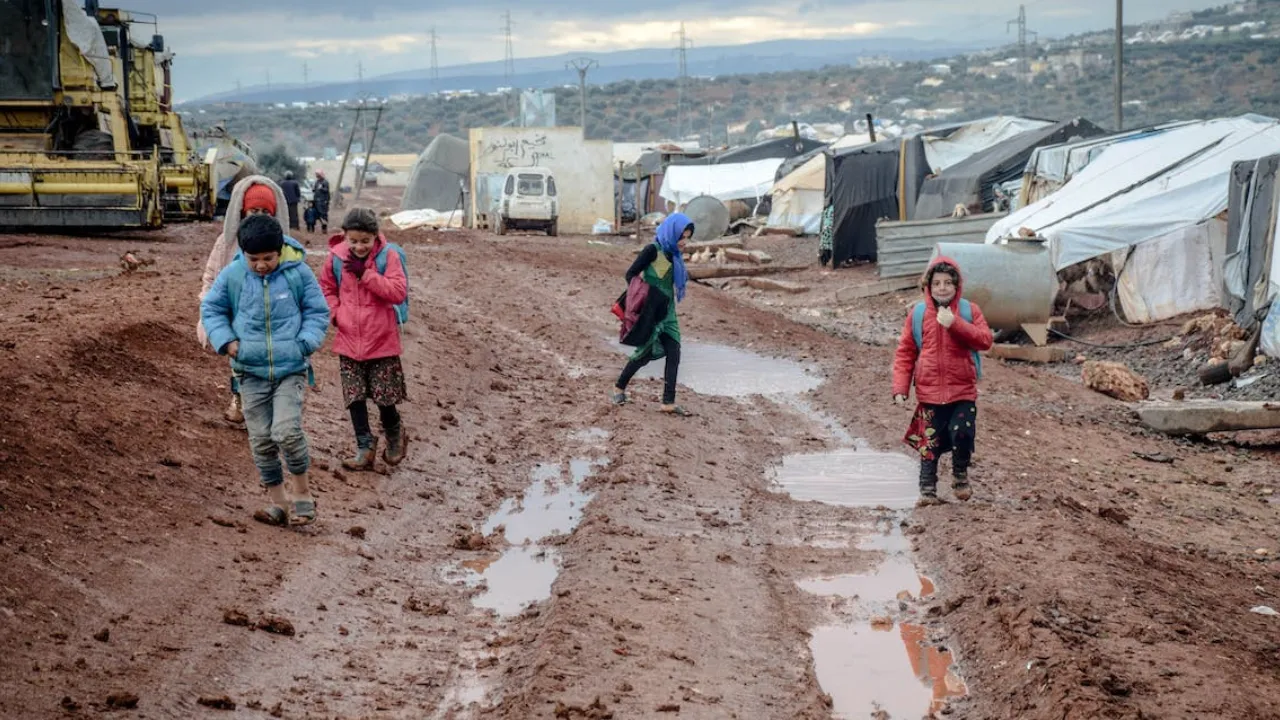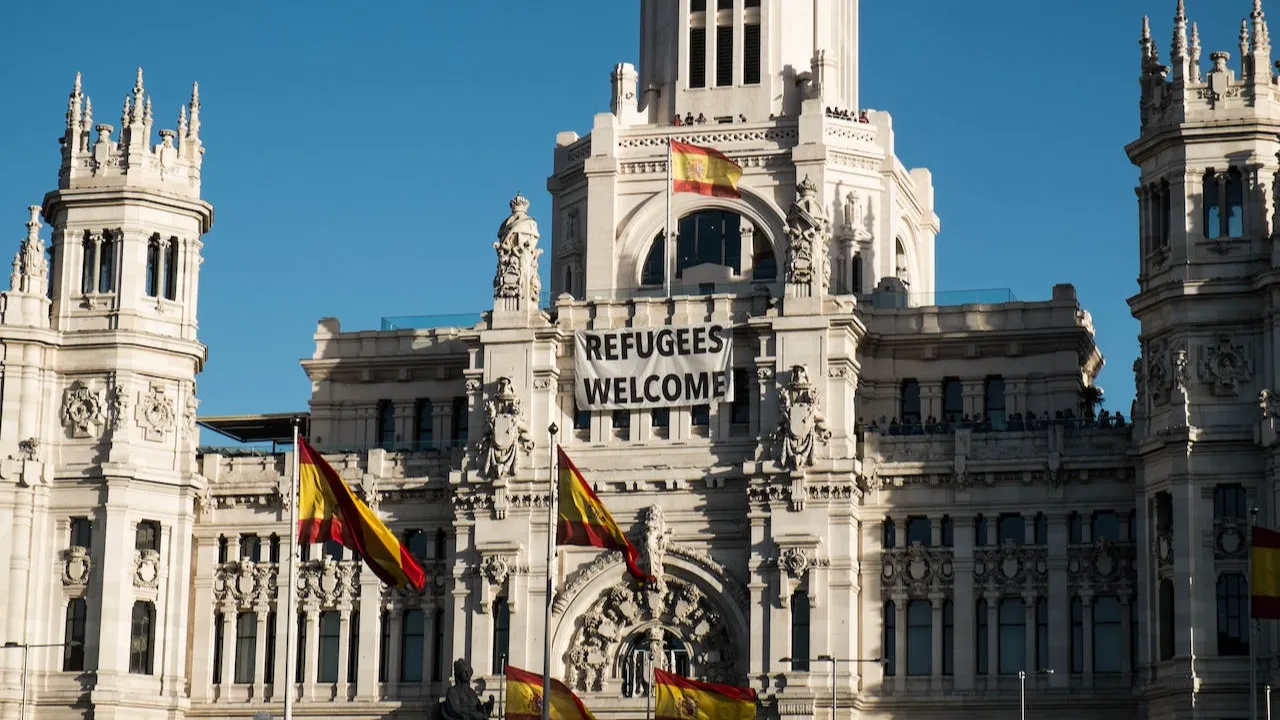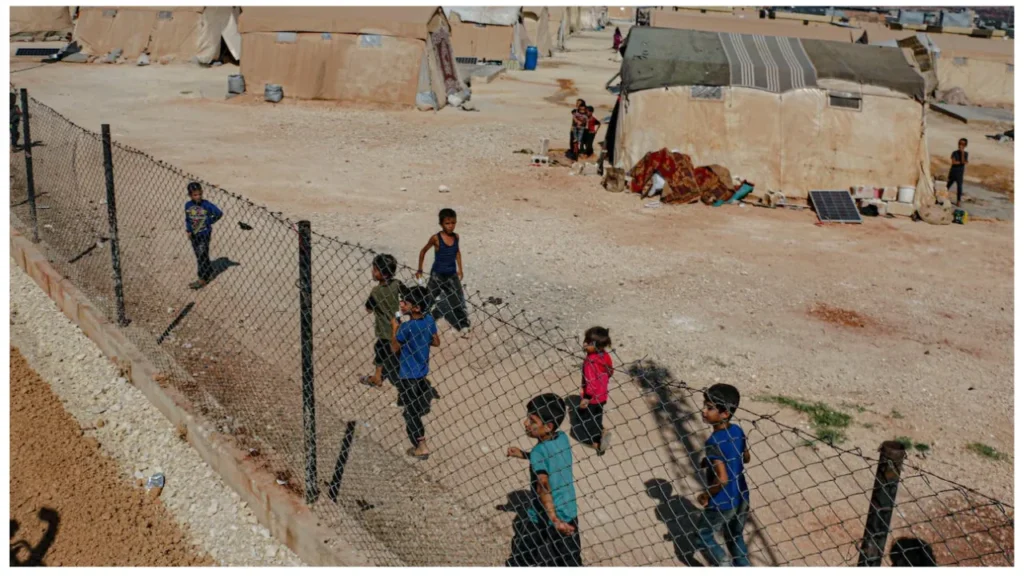In the era of globalization, illegal migration (defined as people moving across borders in search of better opportunities or asylum) remains a concurring problem. The purpose of this article is to identify the problem of illegal migration in the context of globalization and to suggest some measures which can be taken up by the organizations in power to hold on to this problem.
Table of Contents
INTRODUCTION: GLOBALIZATION & PROBLEM OF ILLEGAL MIGRATION
This study explores the interconnected link between globalization and illegal immigration in order to see the reasons that leads the people to travel illegally and also complex process that results from that movement. In order to develop effective policies and strategies to address this complex issue, it is important to understand the history of illegal immigration & its effect on the global economy and its respond to current globalization. This article analyses the many dimensions of this global problem and proposes ways for a more sustainable solution in our society.
BACKGROUND
There is no doubt in saying that the globalization has changed the world’s perspective, turning it to an integrated world in order to achieve interconnectedness and technological advancements. The problem of illegal immigration is one of the most important problems.
Migration has historically been used as a coping strategy, allowing people to flee natural disasters, food insecurity, poverty, oppression, and violence. Individuals may migrate away from their homeland in search of a better life for themselves or their families; however, large groups may migrate when they are “pushed” from their homes by hunger, civil war, violence, or climate change. Whether migration occurs individually or in groups, or whether migrants are “pushed” or “pulled,” this process serves as a vital link between the host and home countries.
Illegal immigration is an issue which is miles away from political, economic, and geographical borders, and is identified by people entering and leaving the country without the proper and verified documentation. In other words, we can say that it is a process of entering a country without the permission of that country’s government and leaving the native country without the government permission. It is a complex issue as it affects all countries and leads to discussion on issues such as social security, financial security, national security, human rights.
Immigration is not changing with the process of Globalization, rather it is increasing year by year with people choosing to live and work abroad more than ever. Current immigration-related events, such as the situation on the Polish-Belarusian border or the most dangerous deaths in the Mediterranean, point to a decline in the globalization. Nowadays, people are often using migration as an important move to change the environment and explore new possibilities for them around the different corner of the world.
In the hindsight if we see, the process of globalization has made it simpler to cross the borders. The primary reason for this change is the difference in the development of the country, the population change and the difference in democratic institutions clearly show this. In this sense, global migration can be considered as an indicator of the current state of globalization. While the growth represents triumph of the global economy, a recession may indicate that the global economy has peaked and is in decline.
As per the data of United Nation, approximately 244 million people lived abroad for more than a year in 2015. This data does not include people such as students, tourists, or seasonal workers, or many people moving within the country. Although this shows the number of people leaving their home country at any given time, it is still a small fraction of the total number of international migrants which are there to be seen in this era of globalization.

LITERATURE REVIEW
- Katherine M. Donato & Douglas S. Massey have investigated how economic differences between sending and receiving countries makes the way for illegal migration. Research in this paper has shown that has differences in the wage and lack of employment opportunities plays an important role in forcing a person to take a decision on migration. Kandel and Massey found that undocumented migrants often work in low-skilled, informal sectors where labor protections are limited. Labor market reforms aimed at formalizing the informal economy can reduce the demand for undocumented labor. This paper lacks the research about the Socio impacts of Globalization on the illegal Migration.
- Ivan A. Aleshkovski examines the theoretical and methodological issues in the study of illegal migration and international cooperation aimed at preventing illegal migration. When analyzing the issues of illegal immigration, the theoretical and methodological justification becomes of a special importance. Currently, without systematizing and standardizing vocabulary, it appears that formalizing data on a worldwide scale cannot begin, making it a particularly pertinent undertaking for the study of illegal migration. The political influence of illegal migration on the international scene is absent from this article.
RESEARCH GAP
Researches on globalization and illegal migration highly focuses on the political and economic aspects of migration. However, there is a lack of prolonged research exploring the complex issues of globalization on various aspects of illegal immigration, including social, cultural policy, business, and politics. While this research provides significant information on the subject, it also leads to oversimplify the of causes that lead to illegal migration. The lack of research in this area is due to the ever-changing scenario in the globalized world. This research would try to fill the gap of the complexity and overall impact of globalization on illegal migration.
RESEARCH QUESTION
- How globalization has played a role in the economic areas that push people to follow the lines of illegal migration, both in origin and destination countries?
- What are the cultural dynamics of illegal migration? And how they affect in increasing illegal migration?
- How has globalization, has paved a way for human trafficking, smuggling, and lead to the terrorism nexus in the globalized world?
RESEARCH OBJECTIVES
- To identify the socio-economic impacts of globalization on the line of illegal migration
- To analyze the cultural dynamics of illegal migration in the context of globalization
- To evaluate the role of globalization in the facilitation of human trafficking and smuggling
HYPOTHESIS
Globalization has contributed to a rise in illegal migration as people seek better economic opportunities and livelihoods in more developed nations.
IMPACT OF GLOBALIZATION ON ILLEGAL MIGRATION
It is well evident to say that globalization has made the world economy, culture, and society more integrated. The most important feature of globalization is that it changes with due course of time but the significant thing is that its impact on economy remains constant i.e., it always gets affected. The economy has been greatly affected, both positively and negatively.
The positive side is that globalization leads to larger economic growth because countries can focus on their areas of comparative advantage and trade with each other. Various businesses get benefit from this as it leads to economies of scale and costs for dormant customers. However, globalization has also caused the conflict between economies to grow as jobs tends to transfer to nations where labor is cheaper. This also puts in evident pressure on environmental resources as companies move their production to countries with safer standards to save costs. Globalization has had a profound impact on the business world. But it also brought some bad things, such as increasing the differences between the number of rich and poor people living in the world and it also leads to environmental destruction.
As cultural issues become more prevalent, cultural conflicts and challenges to established standards become more common. This is because as people become exposed to more and more cultures, they will forget to identify with the beliefs and practices of other cultures. For example, in many societies there is concern that cultural traditions will decline due to cultural differences by the spread of Western civilization. This sometimes leads to international protests and a desire to defend the practice. Globalization has had different effects on countries and cultures. The result is positive effects such as tolerance and understanding of diversity. But the loss of individual leadership and collective achievement also has implications.
Illegal immigration can be dangerous for both the country of origin and the destination country. This often leads to a “brain drain” situation in the receiving country, as skilled workers seek better opportunities elsewhere. Additionally, since the state must provide health services to support these immigrants, there is a heavy burden on national resources. The ‘brain drain’ theory will be discussed in the economic impact.
Illegal immigration within countries can lead to conflict because local people may believe that immigrants may reduce their income, Career options. This could put pressure on public services because the state is expected to provide education and healthcare to the newcomers.
It should be underlined that illegal immigration is a complex problem with no easy answers. Only by understanding its principles and consequences more deeply we can create better policies and strategies to manage and solve these complex problems.
Effects of migration on the Destination Country
Positive effects
- Expansion of economic activities,
- Re-supporting cultural diversity and eliminating skills shortages;
- Increasing local jobs
- Public Service locations According to doctors’ and nurses’ offices, results can be leveraged from the combination of trained personnel.
Negative impacts
- Overcrowding;
- Language and cultural barriers;
- Increased air pollution;
- Increased demand for natural resources;
- Public facilities such as health, housing and schools Services are under pressure; and
- Racism and racism;
- Gender imbalance:
Effects of migration on Origin Country
Benefits:
- Unemployment may be reduced due to less competition for jobs;
- Less pressure on natural resources, including food and water;
- When immigrants return, they bring new skills and knowledge with them; less for services such as education and healthcare;
- Money is often sent back to family and friends (called remittances), thus helping to support local businesses.
Negative effects:
- Less people pay taxes, so tax payments will increase;
- Less immigrants, because people can do it, and education like immigrants. This is also known as brain drain;
- Brain drains (migration of people studying and studying abroad) can have a negative impact on the economy; because it is usually men who act.
Effects of migration on Migrants
Positive effects:
- Opportunity to find a better job;
- A better lifestyle;
- Time to get a better education.
- Political, economic, social and ecological freedom of the country of origin.
Negative effects:
- Communication problems due to language problems;
- Immigration may be used;
- Immigrants may face racial discrimination.
ECONOMIC IMPACT
The growth of economic freedom through cross-border trade of goods, services, capital and information is at the heart of globalization. While globalization on one hand encourages economic expansion, opening new markets, and encouraging technological innovation, & on the other hand it also creates complex economic problems such as income inequality and the country’s position on the economic front in the outside world. The rise of international trade is important for the growth of the economy. The impact of globalization on business is crystal clear. Globalization allows countries to focus on the production of goods and services in which they have a comparative advantage, thereby increasing efficiency and productivity. Therefore, we have seen the development of products at global level, where products are manufactured in different parts of the world and then assembled elsewhere. Due to the interconnectedness of production, rise in global trade is possible. It provides the consumers with the opportunity to obtain various products at competitive prices. However, following the 2008 financial crisis and the recent outbreak of the COVID-19 virus, the supply chain was affected and business exposure increased.
The brain drain problem is directly related to the negative economic situation of the economy in terms of illegal immigration at the international world. Well qualified and highly educated people often decide to leave their country (of birth) in search of better economic opportunities and higher wages. Although exporting countries (origin country) may lead to economic development, they may also lose a lot of human capital and knowledge, which will affect their own growth and development. On the other hand, receiving countries (destination country) are often affected by illegal immigration. Many different industries, including agriculture, construction and hospitality, are often dependent on foreign labour, including illegal work, but have grown through international trade. This part of the workforce is often characterized by low wages and limited access to benefits and employment rights. As a result, business owners may save money but also worry about market abuse and unfair competition. The financial impact of illegal immigration on receiving countries can be devastating and hugely impactful. Anti-immigrant sentiment may arise because some are of the view that illegal immigrants are competition for jobs and social services. For a developing economy, a recession or a period of high unemployment, can make a situation even worse.
Globalization has also had not so fruitful impact on the job market. Jobs that were formerly secure are now vulnerable to global competition and technological disruption as industrial processes have grown more mobile and automated. While globalization has opened doors for highly qualified people, it has also put many unskilled and low-skilled workers at risk of losing their jobs. These difficulties are made worse by the “race to the bottom” phenomenon, in which nations compete for foreign investment by decreasing their labor standards and salaries. Therefore, it is crucial to make investments in workforce education and training to make sure that employees can adjust to the changing needs of the global economy.
Additionally, the role of governments in economic issues has been impacted by globalization. It has prompted a re-evaluation of the state’s historical role in economic regulation and planning. Countries frequently lower tariffs and loosen regulations on some industries as they become more open to foreign investment and trade. This has led to a conflict between national sovereignty and global economic forces, with some claiming that globalization limits governments’ capacity to implement domestic policies that are in their populations’ best interests. However, it has also called for international collaboration in areas including trade agreements, the prevention of climate change, and financial stability.
The economic impact of globalization is the main cause of illegal immigration in many countries throughout history. International communications continue to evolve as a result of globalization, increasing the demand for workers in various sectors. This desire is very useful for those who want to develop their business and is often related to the income gap between sending and receiving countries. Therefore, many people, especially from poor countries, are motivated by illegal immigration in search of better wages and living conditions in other countries.
Another part of addressing the economic impact of illegal immigration is border restrictions and plans to crack down on human smuggling networks. By strengthening border security and control, illegal migration can be deterred and the activities of disadvantaged groups that benefit from the same traders and smuggling can be affected. It is also important to address the root causes of migration. Problems such as poverty, war and oppression need to be solved through social, problem-solving, and humanitarian efforts. International cooperation and development measures are also important to reduce financial support for illegal migration.
In short, the problem of illegal immigration has been greatly affected by economic globalization. It acts as a push and pull force, encouraging people to find better jobs while creating demand for jobs in receiving countries. In the context of international trade, initiatives aimed at improving trade, border management and resolving the root causes are important for trade management. Producing a successful solution to this complex problem also requires balancing economic, social, and legal constraints.

Terrorism Nexus of Illegal Immigration in the world of Globalization
Controlling illegal immigration is seen as a top priority by crime experts, and many anti-immigration activists have seized the opportunity to advance their political goals, owning and legal on the issue.
But there is an important difference between illegal immigrants and criminals. The first are looking for work or opportunities to join their families. The latter ostensibly followed the wishes of religious fanatics who hoped to stabilize domestic politics and religion through violent attacks at home and abroad. Although it is not a popular idea now, it is possible to detect terrorists among irregular immigrants or to “see” terrorists as irregular immigrants.
But many of the concerns voiced by immigration activists and crime experts are valid. Terrorists may enter the target country through inadequate borders and be ignored by domestic authorities or unable to do their job.
However, most potential criminals are still able to reach the port of entry through the law. Even the strictest visa procedures and border controls cannot prevent entry because no state front office has complete information about who will be allowed entry. This is not an “immigration” issue; It is a matter of conscious choice among millions of people who cross international borders every year. Attacks in the US, Madrid and London have shown that some foreigners can use their advantage to organize and carry out attacks from within. These countries’ immigration controls and, to a lesser extent, immigration procedures. There is also no doubt that terrorist immigrants and citizens support the terrorist “cause” and that this sentiment can support the fight against terrorists.
Therefore, the government must do more than strictly control the borders to protect their country from terrorists. The first line of defence requires greater intelligence collection, law enforcement, and international cooperation than is currently possible or likely to exist in the future. The government would do well to review their political and economic relations around the world to prevent any attack on them. In the United States, for example, assistance from immigrant communities has previously helped arrest potential criminals.
Cultural Dynamics
The cultural process of illegal migration in the context of globalization is complex and multilayered, demonstrating the huge impact of connections on people and communities. As people migrate in search of better opportunities, their culture, relationships, and integration with host communities change, creating a potential and subtle problem. Discussing the culture of immigrants is an important part of the culture of illegal immigration. Due to globalization, people are exposed to many cultural influences that question established norms and values. Immigrants often find themselves juggling multiple cultures as they try to preserve their heritage while assimilating into the culture of their new home. When people combine their cultural heritage with their new environment, they can create a hybrid culture. This mix of cultures demonstrates the relationship between globalization and individuality.
The practice of illegal immigration is influenced by social norms. Immigrants often rely on social ties to facilitate travel and integration into the host country. However, when people associate exclusively with others of their own racial or ethnic community, this can hinder their ability to integrate into the larger community and lead to individual conflicts. The challenge is to find the right balance between maintaining social culture and engaging with community members to improve relationships.
Leadership involves social change as well as personal experiences. Diaspora communities are a result of globalization, with immigrants from the same country or region living in different parts of the world. These expats often have good cultural relationships, create a sense of community, and provide assistance to newcomers. They also enhance the cultural diversity of the culture by introducing various traditions, foods, languages and creative expressions. However, they can also be the target of bias and prejudice, reflecting the problems caused by cultural diversity in the world.
In addition to personal experience, cultural leadership also includes social development. Globalization has led to the emergence of diaspora, which consists of immigrants coming from the same country or region but living in different parts of the world. These expats often have strong cultural ties, creating a sense of community and providing support to newcomers. They also contribute to the richness of the host culture by introducing a variety of traditions, cuisines, languages, and arts. However, they can also be the target of discrimination and conflict, which illustrates the problems caused by cultural diversity in the world.
Role of globalization in the facilitation of human trafficking and smuggling
We are now in the business dominant world. One of the most important and stressful is the role of international trade in supporting human trafficking and business. Although greater business integration and better connectivity are two of the many advantages of international business, they also create opportunities and challenges for criminal organizations such as human trafficking and smuggling.
Human trafficking continues to expand due to globalization, making it easier for criminal organizations to transport criminals across borders. It has become easier for traffickers and smugglers to transport victims and customers across international borders due to improved connectivity through air travel, sea and land transportation. As a result of this movement, these criminal practices have become increasingly common, making them difficult to detect and stop. Additionally, the Internet and the digital revolution have fuelled human trafficking and human trafficking. Criminal networks can now use Internet communication tools and platforms to find victims, organize transportation and market their services. The Internet’s ability to maintain anonymity makes it difficult for law enforcement to identify and arrest criminals. Unfortunately, the digital dimension of globalization has accelerated the growth of these illegal activities.
Another aspect of globalization is trade inequality between countries; This makes people more vulnerable to smuggling and trafficking. As the global economy brings together prosperous countries with other economically disadvantaged countries, differences in living standards are becoming more pronounced. This economic imbalance creates a demand for cheap labor and illegal services, and organized crime takes advantage of this imbalance. Vulnerable people are driven into illegal migration or forced into human trafficking in search of better job opportunities.
Globalization affects law and this causes crime. Smugglers and traffickers take advantage of the fact that many countries have different immigration and human rights laws and regulations. Due to the lack of international harmony in the field of law and practice, these crimes have the potential to lead to illegal immigration and legal asylum. All efforts to combat human trafficking and smuggling must consider the fact that human trafficking and smuggling is a transnational crime.
In order to solve these problems correctly, the police need to cooperate internationally and share information. International organizations such as the United Nations and Interpol are important for cooperation in preventing transnational trade and human trafficking. In summary, globalization has given criminals greater mobility, access to digital tools, and financial capabilities, leading to human trafficking and facilitating theft. Because of international freedom, these crimes thrive through unequal financing, judicial systems, and international cooperation. To be effective, challenges related to international trade require cross-border cooperation, harmonized legislation and comprehensive measures that address the root causes of impact to protect people’s trade and jobs. By recognizing and preventing the role of international trade in these illegal activities, the international community can work to eliminate serious human rights crimes.
Suggestions
A multidimensional strategy is needed to solve the complex problem of illegal migration in the context of globalization. Here are some ideas that can help solve this problem:
- Bilateral and Multilateral Agreements: There is need to know how origin and destination countries can use bilateral and multilateral agreements to control the illegal migration. A well debated and settled agreement is needed that provides legal access to immigrants and addresses concerns of both countries, such as economic and social needs, could be the prima facie solution of this.
- Encouraging the reforms in the domestic labor market that can help reduce the problem of immigration and reduce incentives for illegal immigration. Various polices could be framed up the order so that there could be possible increase in employment, provide fair wages, and secure the rights of all workers so that the need for illegal migration to the destination country reduces.
- We need to analyze the impact of education and skills development in origin countries as it can help to reduce illegal immigration. Financial support for education and career development must be provided as it opens financial options and prevents people from using illegal means to work abroad.
- Organizing community services at a regular interval in order to that have a greater impact on local communities in the origin countries. This will examine how these programs provide a major boost to the people to leave their communities and address the underlying issues that lead to migration, such as poverty and lack of assistance and housing.
- See the potential contribution of international organizations and international regulatory mechanisms to the problem of illegal immigration. So that these organizations can focus on how international cooperation can be better and solve problems caused by migration in the international environment.
- We need to assess the relationship between migration and climate change mitigation. We need to come up with the environmental solutions that could reduce migration and environmental degradation resulting from natural disasters. The effectiveness of humanitarian programs in protecting and assisting vulnerable immigrants and refugees can be evaluated.
- Organizing public awareness programs and education on behavioral change towards immigrants. The relationship between people’s doctrine and their judgment of tolerance and truth must be studied together in order to reduce the problem.
- To collaborate on the use of technology to improve the border management process. In case there is illegal cross border migration it should be cope with the use of latest technological advancements.
CONCLUSION
To summarize, the issue of globalization and illegal migration is a multidimensional, multifaceted, everchanging & dynamic process that continues to profoundly change our world. As we have seen throughout this research article, globalization has been enshrined and enrooted in an era of unparalleled interconnection, encouraging individuals to transcend borders for a variety of reasons. Hence, globalization has contributed to a rise in illegal migration as people seek better economic opportunities and livelihoods in more developed nations. This phenomenon is both a reflection of the changing global environment. However, the symbolic link between globalization and migration also give rise to the problem of social integration, security, and human rights. Policymakers, researchers, and practitioners must negotiate these problems with empathy, cooperation, and new ways as the globalized world evolves.
SCOPE OF FUTURE STUDY
- Human Rights and Ethics: We need to expand the area of investigation into the ethical components of illegal migration, such as the treatment of migrants and refugees, human rights safeguards, and ethical concerns in border control procedures. This would entail us to investigate the unearthed problem of illegal migration also covering the highly anticipated issue of human rights also
- Border Security and Control: There is much needed investigation or research is required to oversee the changing landscape of border security and control methods in a globalized world of today. In order to examine the efficiency of security measures, their effects on migrants’ rights and well-being, and any ethical considerations is also required to be taken care of.
- Global Governance: The study is required to be done in order to assess the role of international organizations and global governance institutions in addressing the difficulties and possibilities that illegal migration presents in the context of globalization. The role of United Nation and its specialized agency can be of great use in order to stop this complex issue.
- Conduct comparative research across regions and nations to uncover similarities and variations in how globalization effects international migration and its consequences. This comparative research may provide the unearthed and unheard causes of illegal migration between the origin & destination country.
Future study in this area will strengthen our understanding on this complex issue of Globalization & illegal migration and would offer a new perspective on this conflict.







